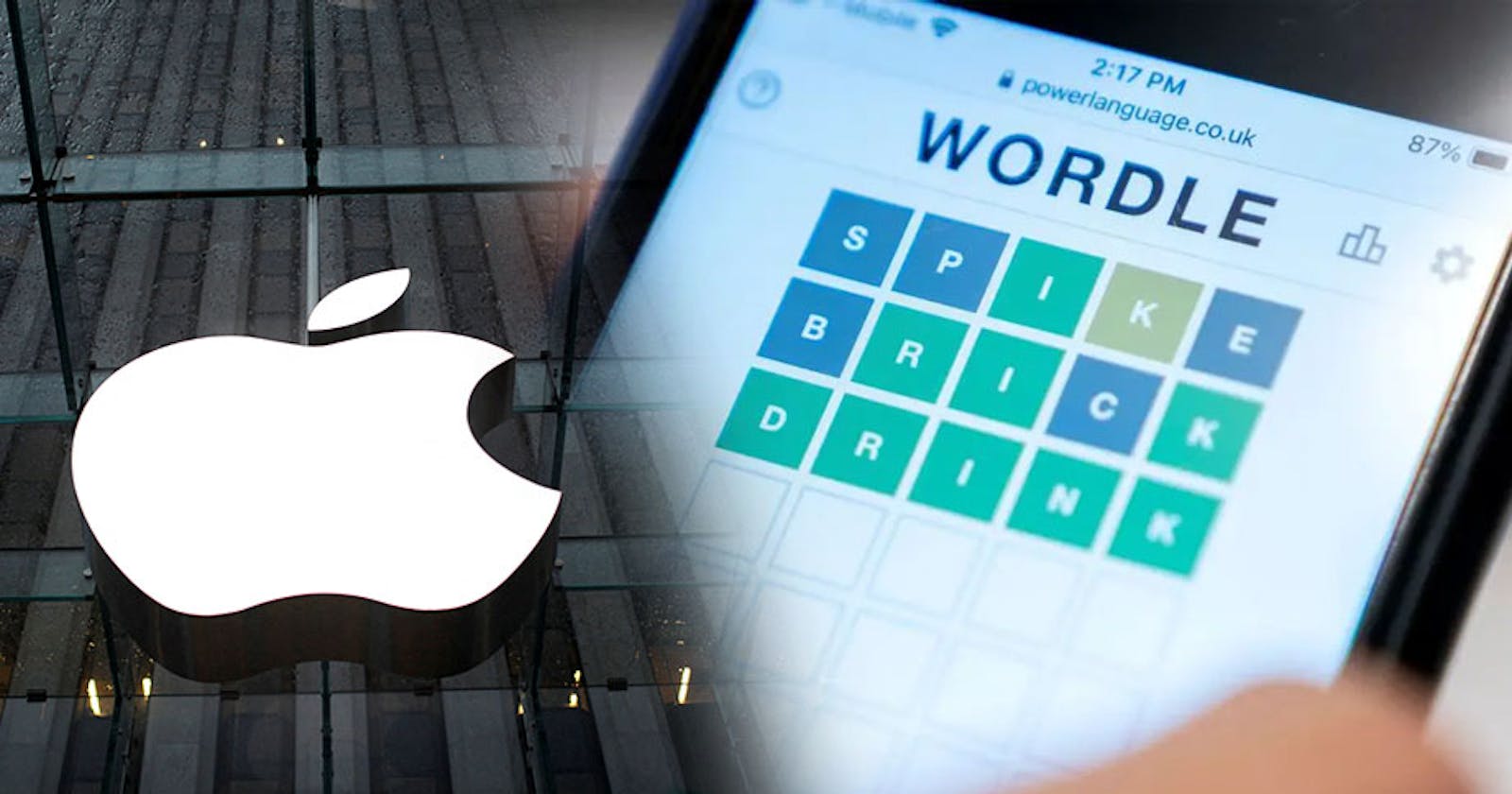Wordle is a web-game that has gone viral over the past month, quickly growing to hundreds of thousands of users. A game can be as short as a few minutes — all a player does is try to guess a five-letter word in six tries. In the tradition of crossword puzzles, everyone gets the same new puzzle once per day.
Wordle is completely free, with no ads or downloads. Its website doesn’t even have its own domain — it’s a sub-page of the personal website of its creator, Josh Wardle. Wardle, a software engineer in Brooklyn, made the game for his partner because they enjoy playing word games together, with no interest in making money from it. Even after his game went viral, Wardle said, “I like giving it away for free — part of the point is it’s free.”
Given the simplicity of the game, and the fact that it has no presence on Apple or Google’s app stores, copycats quickly realized there was an opportunity to make money from people looking to try out Wordle. Several apps with the same name, look, and game mechanics popped up, monetized with either ads or in-app purchases.
One copycat bragged on Twitter about how many downloads his app was getting, and how many users started a free trial for his $30 per year subscription for a pro version. After less than a day of these tweets drawing heavy criticism from Wordle players, Apple had removed all clones of Wordle from the App Store, without any requested intervention from its creator.
Apple’s choice to crack down on Wordle knockoffs drew various concerns: Given Wordle has no formal trademark, did Apple overreach its power? Should small app developers be afraid of Apple if their ideas aren’t totally original?
Let’s set the record straight: Apple’s choice is good for consumers, and therefore Apple was right to remove Wordle knockoffs from its App Store. I don’t think this is a particularly novel opinion, but it is a good opportunity to examine important topics such as App Store moderation, when copying products goes too far, and what outcomes are in the best interest for the most people.
“Where should Apple draw the line at copying ideas?”
Allowing creators to reuse ideas enables them to build and expand on the work of others — this freedom is key for allowing innovation to flourish. Wordle itself is derived from older games like Mastermind and Lingo, and that fact does not diminish its success in the slightest.
However, this question is misleading, because the Wordle knockoffs did not merely copy an idea. By naming the app “Wordle”, developers are intentionally misrepresenting their product. The Wordle app that sparked criticism on Twitter even went as far as making their slogan: “The game everyone is talking about!” Let’s not confuse misleading marketing with reusing ideas.
You can see that Apple considered the name the real problem: today, searching Wordle on the App Store will return games that happen to be named Wordle from years ago, but also copies of Wordle that are under a different name are still up. You can rest assured that you’re free to reuse ideas, just don’t call it the same thing. (Side note: the creator of the unrelated Wordle iOS app reached out to Wardle to discuss donating all of his profits to charity.)
Copying an app’s name may be legal if there’s no trademark, but allowing developers to do this leads to a poor user experience for App Store users. The App Store is a retailer just like your grocery store (albeit with much different power dynamics): if it was legal for me to make my own cookies and package it exactly like Oreos, a prudent grocery store would still choose to not distribute my product. Shoppers would start noticing how hard it is to find the actual product they want, and start shopping elsewhere. In the short term, the retailer benefits from getting a cut of a knockoff’s profits, but in the long-term, they lose customers.
(Side note: Some argue that the name Wordle is generic enough to be re-used, as if it was equivalent to naming an app Crosswords. This is absurd and disingenuous. If that were the case, copycats wouldn’t be tripping over each other to make it the name of their app. Try making that argument once Wordle’s viral growth slows down.)
“Apple lets plenty of knockoffs stay up, and is just doing this to avoid bad PR”
Moderating the App Store, one of the largest marketplaces on the internet, is a hard problem. I agree that Apple could do a better job at catching these issues without having to rely on journalists reporting on Twitter drama. This doesn’t change the fact that Apple was correct to take down Wordle knockoffs. They need to be doing more of this — claiming that Apple is only trying to avoid bad PR ignores the fact that they did something to help consumers.
Furthermore, I don’t think Apple is worried about merely bad PR from this incident. What Apple is worried about is drawing the attention of regulators to the shoddy, predatory apps they allow. Around the world, regulatory bodies have been increasingly successful in passing pro-consumer laws for how tech companies operate. This momentum makes a more regulated tech industry virtually guaranteed.
If Apple is seen as being unfit to protect users from predatory apps, they risk regulators feeling the need to step in. Apple does not want to deal with the expensive process of complying with external regulation (or worse for Apple, breaking up the App Store and the iPhone, like regulators attempted to do to Internet Explorer and Windows). It makes much more sense for Apple to run a tight ship internally to avoid these costs. Because of this, yes, journalists have the power to pressure Apple into action, lest regulators start wising up.
If you think Apple has too much power over these kinds of decisions, that’s fair. They’re running a marketplace that is too big for them to moderate properly, and have a huge say in all of our experiences online. That’s why the role of thoughtful government regulation is so important.
The threat of regulation, unlike Apple trying to squash bad PR, is a good thing for consumers. We get a higher quality App Store.
“But what if a someone does want a Wordle app?”
Wardle has expressed no interest in making an official Wordle app. If the user really needs one, just download any of the ones that are still up under a different name.
Beyond that, there is a value in Wordle’s game design that is harder for knockoffs to copy: the shared experience. After completing a game, Wordle players can share a spoiler-free summary of their guesses via a visualization built out of square emojis, showing how many guesses they made, and when they got the right letters in the right or wrong places.
C. Thi Nguyen, a philosophy professor, mused about the value of this game design: “I don't know any other game that has nearly as graphically neat a synopsis, where you can just see the whole arc of another's attempt so quickly. That wonderful bit of communication - a little encoding of agency in graphical form - combined with the decision to just give everybody the same word a day, means we can share a struggle. And you can quickly grasp the shape of each others' dramatic arc that day.”
Unless Wordle clones copied the exact line-up of words used for each day’s game — which is unlikely since the copycat is trying to make a quick buck — the emoji share feature becomes almost meaningless when the puzzle isn’t the same for everyone. (There’s other thoughtful, subtle design decisions that knockoffs are also unlikely to properly replicate: the curated list of possible answers, handling edge cases —such as guesses with repeated letters — gracefully, and so on.)
If someone is fully aware of the original Wordle and still wants an app version, then sure, download a copycat. More likely, a person searching for Wordle on the App Store has never tried the game before, and these knockoffs would be a worse-quality substitute that takes away the social aspect of the game. Once again, the consumer experience is better off when Apple avoids misleading users.
I personally admire the artistic spirit of Wardle’s creation: a fun, shared experience that doesn’t extract anything from its users. When asked if he would ever monetize the app, Wardle said, “I was really happy with it when it was just my partner and me playing together. It’s really easy to get seduced by all that stuff, but I try and instead be like… I was happy then, and I think I’ll be happy in the future if that’s where it ends. If at the end of the day with Wordle, it’s just her and me playing again, I think I’ll be totally happy for that to be the outcome.”
These kinds of passion projects are what make the internet a delightful place. It’s similar to helping build part of a well-designed park, library, or other public space. While Wordle is not literally public, trying to profit from it feels the same as an Amazon locker popping up in the middle of a park. Like its creator said, part of the point is that Wordle is free, and encroaching on this ideal is a shame.

